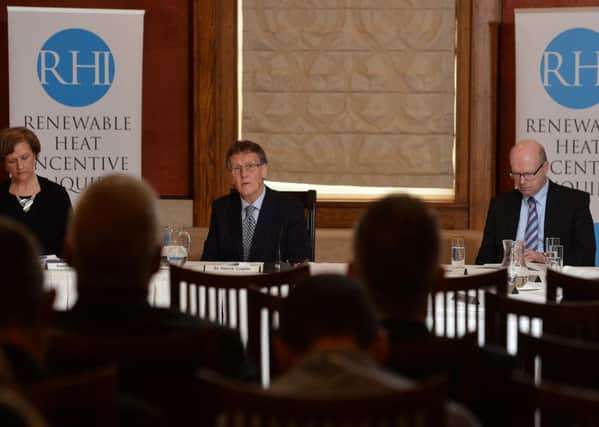Cash for ash public inquiry amassing vast body of evidence


Sir Patrick Coghlin, the retired judge chairing the inquiry, yesterday spoke publicly for the first time about its work, providing detail about how detailed its work will be.
Sir Patrick confirmed that the inquiry into the Renewable Heat Incentive (RHI) – which perversely incentivised claimants to run what were supposedly green energy boilers around the clock – has decided to move directly to issuing formal notices compelling written and electronic documentation, using sweeping powers under Section 21 of the Inquiries Act 2005.
Advertisement
Hide AdAdvertisement
Hide AdSpeaking at a preliminary hearing in Stormont’s Parliament Buildings, Sir Patrick said: “The 2005 act provides the inquiry with statutory powers to compel, amongst other things, the production of documents and witness statements.”
He said that he had decided “generally” to immediately proceed to issuing such notices which are effectively an order which must be obeyed on pain of a potential six-month jail term.
That, he said, was the “most expeditious way for the inquiry to proceed”, adding: “The inquiry has to date served around 125 such notices on individuals and organisations compelling both the production of relevant documents and the provision of information that may assist in identifying further relevant documentation which may exist.
“This is obviously a very considerable number of statutory notices but it demonstrates the inquiry’s determination to ensure that it gathers all relevant documentary evidence.”
Advertisement
Hide AdAdvertisement
Hide AdSir Patrick said that “further such notices will continue to be issued in due course”.
The retired Northern Ireland Court of Appeal judge went on state that in some cases a single one of those notices may relate to “many thousands of documents, including vast amounts of electronic communications”.
He said that “already the inquiry has been provided with very many thousands of pages of documents which have to be considered and evaluated. Indeed, the inquiry anticipates that the documentary evidence which it gathers will run to many hundreds of thousands of pages, if not more.
“The gathering of documentary evidence is one of the first, but most important, stages of an inquiry’s work.”
Advertisement
Hide AdAdvertisement
Hide AdThe inquiry has already made clear that in all but exceptional circumstances it intends to publish this documentation.
Sir Patrick also resolutely refused to set out even an indicative time frame for his inquiry, saying that it was not possible to do so, given that the inquiry will have to react to the evidence which emerges during hearings.
However, it is already clear that former finance minister Máirtín Ó Muilleoir’s initial suggestion of six months for the inquiry is wildly wide of the mark. In fact, from the details set out yesterday it is clear that public hearings will not even have begun by that point.
Sir Patrick said that he doesn’t intend to begin public hearings until “early autumn”. If that means September, it would be eight months after the establishment of the inquiry.
Advertisement
Hide AdAdvertisement
Hide AdThe way in which Mr Ó Muilleoir set up the inquiry means that it has no cost limit and no time limit.
However, Sir Patrick stressed that it was more important to work thoroughly than to race through its work in a way which doesn’t get to the heart of what happened.
He said: “I doubt very much whether the public concern which gave rise to the establishment of this inquiry would be allayed by a process which was subsequently revealed to have proceeded upon an inaccurate basis of fact largely because the thoroughness of the investigation had been sacrificed in the interest of a speedy conclusion.
“At this early stage it remains the case that it is simply not possible, or useful, to attempt to place any accurate timescale on the length of time which the inquiry will take to complete its work. As matters become more clear, the inquiry will, of course, seek to update the public accordingly.”
Advertisement
Hide AdAdvertisement
Hide AdYesterday Sir Patrick also introduced his inquiry team, who were present for his 45-minute statement.
Sir Patrick will be joined on the panel by Dame Una O’Brien, the former permanent secretary of Whitehall’s Department of Health.
The inquiry will also be assisted by an expert “assessor”, Dr Keith MacLean, a former managing director of SSE Telecoms and an advisor on energy to both the UK and Scottish governments.
The inquiry’s senior counsel will be David Scoffield QC, who has acted for and against many government departments. He recently appeared for Ashers Bakery and also on behalf of the parties challenging Brexit in the High Court. The inquiry has also appointed two junior counsel, Joseph Aiken and Donal Lunny, and a solicitor, Patrick Butler, as well as Andrew Browne who will be secretary to the inquiry.
Advertisement
Hide AdAdvertisement
Hide AdSir Patrick said that all witnesses who give oral evidence will be questioned under oath or affirmation, but stressed that it was a fact-finding process rather than an adversarial trial.
Sir Patrick stressed that he would not be investigating each situation where a claimant was alleged to be abusing the scheme – although he said that it may investigate some such situations.
The former High Court judge said that he will be writing to every RHI claimant “to seek their assistance with the provision of any information or documentation which may be relevant to the matters which the inquiry is charged to investigate”.
And, setting out the focus of the inquiry’s work, Sir Patrick said that will involve looking at the role of ministers, civil servants, special advisors, departments, consultants and those administering the scheme.
He vowed: “The inquiry will investigate accountability for any failings which it finds in the scheme, wherever that accountability may lie.”